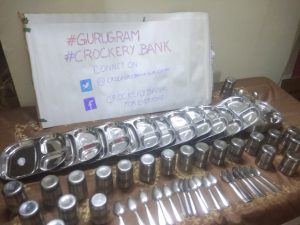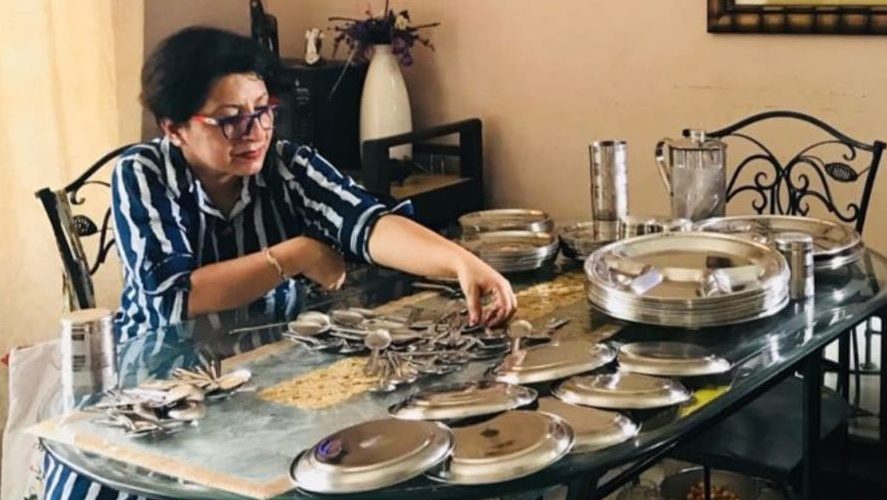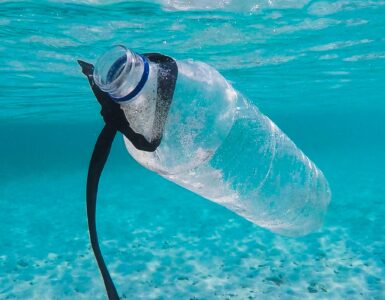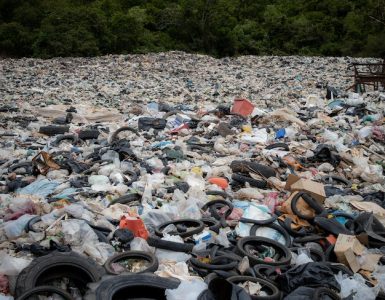All of us at some point in time would have organized small parties and social gatherings where we invite a few people for food and drinks. If the occasion is not managed by professional event coordinators or caterers, the task of arranging cutlery is not an easy one. Especially if you are one of those who make environmentally conscious decisions.
Due to a lack of sustainable and viable options, the majority of us buy single-use disposable cutlery – plates, cups, glasses, spoons that are made with plastic and styrofoam.
What if there is a solution, which is environmentally friendly and is available for free.
Sameera Satija started ‘Crockery Bank for Everyone’ to encourage and motivate people to ditch the single-use plastic cutlery in favor of stainless steel crockery. Anyone can pick up the steel utensils from Crockery Bank for everyone, and after the event, simply wash them and return it back for them to be utilized by someone else.
To make it even more noteworthy, anyone who is aligned with the concept, Crockery Bank for Everyone can be replicated by them in their respective region. Until February 2022, more than 30 Crockery Bank for Everyone is available across India, serving their local communities and reducing plastic waste in the process.
Sameera first tested this idea on 22nd June 2018. You might ask, what is so special about the day?
Nirjala Ekadashi is an auspicious day in India, which is celebrated in the month of May/June, where many people observe abstinence of food and water. As the no water(nir-jala) part is extremely difficult to follow during the hot summer months, it is a common practice where people distribute a glass of cold water to anyone seeking a drink on the street. In 2018, the day was celebrated on 22nd June.
Sameera is a shining example of someone, who doesn’t just sit on problems, instead, they make efforts to bring a change. This is a unique initiative to make our societies plastic-free and create a system where we substitute single-use crockery with environmentally friendly alternatives. We had a wonderful conversation with Sameera Satija, who shared the reasons for starting Crockery bank for Everyone and why is it important for us to reduce plastic waste from our environment.
Below are the edited excerpts of our conversation, for the full discussion you can watch the video on YouTube.
What were you doing before you started Crockery Bank for everyone?
I work for the Indian central government as an Auditor and am always involved in environmental initiatives. In my spare time, I have volunteered for many causes including tree plantation drives, waste management activities, composting, waste segregation, etc.
What was the problem that you saw?
We all understand the consequences of waste, where it ends up in landfills. I was involved in the audit exercise of landfills and my assessment pointed out that a huge volume of waste landfills comprised of disposables. Other kinds of plastic waste get recycled but single-use plastic does not get recycled and it continues to remain in landfills.
I realized that many times after a social gathering, religious occasion, community food distribution (Bhandara) events, etc, single-use plastic disposable cutlery is thrown in the open. Most often these items are so flimsy that they don’t just lie, rather they fly to enter the water bodies, choking the drains, gutters, and stormwater pipes.
Further, these loose plastic items are also detrimental to stray animals and birds. I have personally seen dogs and cows literally choking after putting these plastic items in their mouth. In addition, huge volumes of plastic enter the oceans causing marine pollution.
Mainly there are 4 dangerous impacts of plastic pollution:
- Pollutes the water bodies
- Gets eaten by Stray animals
- Pollutes the Environment when it is burnt in the landfills
- Impacts the health of people who consume food on styrofoam cutlery. Styrofoam contains chemicals like styrene, which can cause serious health issues like cancer.
These four reasons made me decide to take some action and I started exploring options. The first thing which I did was to search for the plates that were made with leaves (patal plates) but to my surprise, there were none available in the market. I was told by shopkeepers that these days only styrofoam-made cutlery is functional. This fact made me realize that if there is no alternative available, just creating awareness will not help.
What was your inspiration behind this initiative?
I belong to the Sikh community, where we regularly visit Gurdwara. In the Gurdwara, it is a normal custom to serve food in stainless steel utensils. I thought if Gurdwara can serve food in stainless steel utensils, what stops the public at large from not using it.
How did you manage to test your idea?
When I was working on this idea in 2018, Nirjala Ekadashi (an Indian festival where people observe fasting) was coming. As it happens during the hot summer month of June, it is a tradition to set up stalls on the streets and give out cold water to any passerby. Over the years, the water is served in single-use plastic glasses.
I decided to test my idea on the day of Nirjala Ekadashi and purchased 100 steel glasses for this purpose. I informed local groups in my circle that if anyone is organizing a water distribution activity, they can use the glasses which I bought.
I was able to distribute the glasses with 3 groups of 30 glasses each. As you don’t need too many glasses at a single point in time, as the concept is to rewash and reuse. After the event, we analyzed that approximately 7000 single-use plastic were prevented from going into landfills.
The success of this one-day event and the impact it created were extremely motivating for me to start this journey.
I further validated the idea by contacting a building contractor from my social group, who regularly distributes free meals (bhandaras) to laborers working under him on single-use plastic containers. Though he was reluctant initially with regards to the hassles of washing the plates, I managed to convince him to try it out at least for one day. At the end of the day, when I called him to find out the reaction, he was extremely ecstatic by the response and has since then has brought his own set of utensils to do his bhandaras.
Gradually the word spread, more inquiries started flowing and I had to buy many more plates and glasses to cater to people.
What is the process for anyone who wants to use the service of Crockery Bank?

The process is very simple, anyone can take the crockery, use it, wash the crockery after use and give it back to us. For using the service, there are no charges, but in case of any damage or loss of crockery, people need to pay for that loss.
The process is explained to anyone using the service and in addition, we take identification proof that has a local address.
How can people contact you?
They can contact me on Crockey Bank for everyone’s social media pages like Facebook and Instagram or my personal Facebook page.
Why are you offering crockery for free, you could have easily established monetization mechanisms?
As I am involved in the environmental space for a long time, I realized that most people are not ready to make any effort and take things for granted. To take people out of their comfort zone (use and throw lifestyle) by asking them to take the crockery, use, wash and give it back is an extra effort for people. If I charge money from them, no one will do it.
To motivate them and tap the psychology of a free thing, I decided to make this service for free and it worked. The message was very clear to anyone using this service, you can save money and also conserve the environment.
Would you like this initiative to be replicated at other places?
This is an environmental cause that is meant for everyone. From the very beginning, I wanted this cause to be replicated.
When people offer donations for buying additional crockery, I advise them to start their own Crockery Bank. The initiative is open to anyone and they can start in their own community with a few crockeries and utensils.
We have 30 teams across India, who are giving crockery to everyone and a large number of people who are doing it within their own communities and societies.
Did you face any friction or challenge in running this initiative?
There are times when people ask the same number of crockery as the number of guests they are serving, for example, if they are having 500 guests, they ask for 500 pieces of crockery.
People need to understand that when we are serving a large gathering, not everyone will eat together. Therefore I have to convince them to take only a portion of crockery pieces in relation to the number of people who will be eating. Moreover, from the logistics point of view, it is easier to manage a lesser quantity of utensils than a big set.
The people who use Crockery Bank for Everyone regularly, do not take more than 100 pieces of crockery.
What was the reason for naming this initiative Crockery Bank for Everyone?
The whole idea is that it is Crockery Bank for Everyone, as it is supposed to be used by everyone, replicated by everyone, and also maintained by everyone.
What is your personal connection with nature and the environment?
As a child, I read about our fundamental rights and duties that are enshrined in the Indian constitution. There is a duty that asks every citizen need to take care of forests, water bodies, the environment, and all living beings. I have imbibed that thought to lead a life that follows this duty.
I am living a very sustainable lifestyle, like not using any single-use items, including plastic, clothes, etc. I believe in reusing and recycling any items that I bring for my lifestyle needs. I have stopped many chemical-laden items and instead make my own product like bio enzymes, which is made out of citrus waste, peels from Oranges, and Lemons.
When you start walking on this journey, there is learning every day and you constantly improve. There is a thought which says that we don’t need a handful of people doing sustainability perfectly instead we need everyone doing it imperfectly.
You can watch the full interview on the Change Started YouTube channel.






Add comment